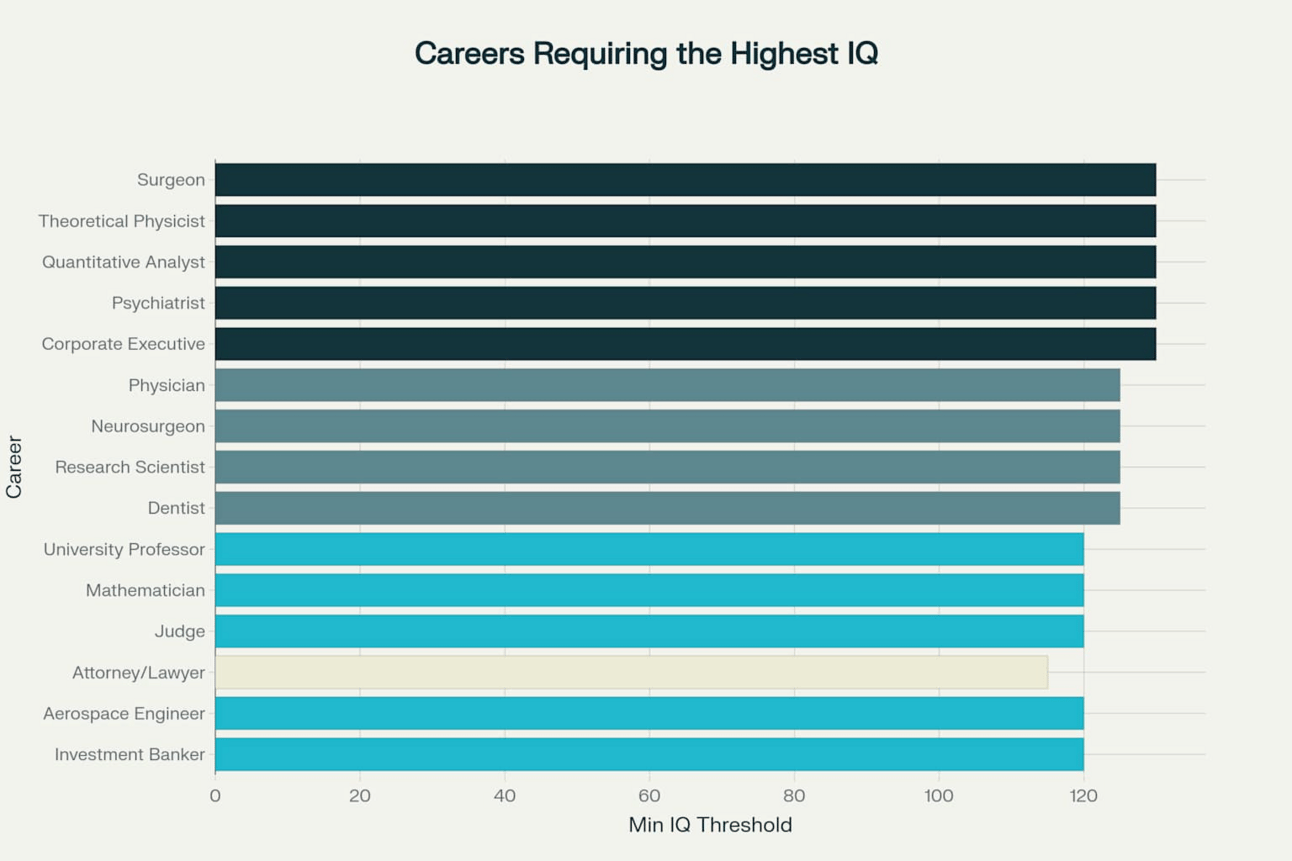- Enhancing Brain
- Posts
- Careers That Require the Highest IQ
Careers That Require the Highest IQ
Ever wonder what jobs actually need a high IQ?
Not just pay well or sound cool… but require serious brainpower to even survive in them?
I wanted to know which careers filter for the top 1%, the ones where raw intelligence isn’t optional.
Here’s what I found…
Table of Contents
Why IQ Matters for Careers
Let’s get this out of the way: IQ isn’t everything.
But it does predict one thing really well - job performance.
Meta-analyses show that intelligence is the single strongest predictor of how well someone does at work. Especially in complex jobs.
🟧 Here’s what studies found:
🔸 IQ predicts up to 51% of job performance in high-complexity roles
🔸 People with higher IQs learn faster, adapt quicker, and solve harder problems
🔸 IQ explains why some careers even exist, you literally need a certain level to handle them
This is why certain fields have cognitive entry barriers. If you can’t grasp the complexity, no amount of passion or hustle will cut it.
IQ also impacts how long you train, how fast you level up, and what kind of work drains or energizes you.
So yeah, it matters, especially when we talk about the top 1% careers.
Careers Requiring High IQ

Some jobs demand way more brainpower than others.
Based on research and real-world data, these careers sit at the very top of the IQ ladder:
🔹 Surgeon - IQ 130–160
Mastery of anatomy, rapid decisions under pressure, and extreme precision.
🔹 Theoretical Physicist - IQ 130–150
Abstract math, complex models, thinking about stuff most of us can’t even imagine.
🔹 Quantitative Analyst (Finance) - IQ 130–150
Math prodigies turned data warriors. They build models that predict financial markets.
🔹 Judge / Lawyer - IQ 125–135
Need to analyze legal texts, construct airtight logic, and out-debate other high-IQ people.
🔹 Aerospace Engineer - IQ 120–130
Designs systems that can’t afford to fail—planes, rockets, satellites.
🔹 University Professor (STEM) - IQ 120–140
Research, writing, teaching, and mastering their niche. It's mental endurance.
These aren’t just careers where smart people end up.
They’re fields where high cognitive ability is a requirement just to function.
And even within those jobs, the best of the best are usually even smarter.
Why High IQ = Better Job Performance
It’s not just a flex, IQ is actually one of the strongest predictors of success at work.
A massive meta-analysis by Schmidt & Hunter found:
🔸 IQ had a 0.51 correlation with job performance, higher than interviews, personality, or education.
🔸 The more complex the job, the more IQ matters.
(Being a barista? Not so much. Being a neurosurgeon? Crucial.)
Here’s what raw intelligence helps with on the job:
🔹 Learning fast - new skills, new tech, no problem
🔹 Solving problems - analyzing complex data, making decisions
🔹 Adapting - keeping up with rapidly changing industries
🔹 Staying sharp - fewer mistakes, better long-term memory
That’s why high-IQ people tend to climb faster and handle more responsibility.
Not because they’re better humans, just better suited for mentally demanding roles.
Why High IQ Isn’t Everything
Having a high IQ might get you into elite careers, but it doesn’t guarantee success within them…
Here’s what actually matters once you’re in:
🟩 Emotional intelligence (EQ)
High performers can read people, stay calm under pressure, and handle stress, IQ can’t teach you that.
🟩 Grit & discipline
Talent gets outpaced quickly by hard work. Many top professionals simply out-train the competition.
🟩 Communication skills
In fields like law, medicine, and tech, being able to explain complex ideas clearly is often more valuable than raw intellect.
🟩 Adaptability
Even top-IQ professionals fail if they can’t evolve with the job. Tech, science, and AI fields change fast.
So while IQ opens the door…
EQ, grit, and soft skills decide how far you’ll actually go.
Final Take
The smartest people on the planet don’t just “get lucky” with good genes.
They train their brains with hobbies that stretch, challenge, and grow their mental muscle.
From chess to jazz, knitting to Go, strategy games to language learning…
Whether you want to boost your memory, sharpen your focus, or just feel more alive, pick one thing that excites you, challenges you, and keeps you coming back.
And remember:
Intelligence isn’t just what you’re born with. It’s what you do with your time.

